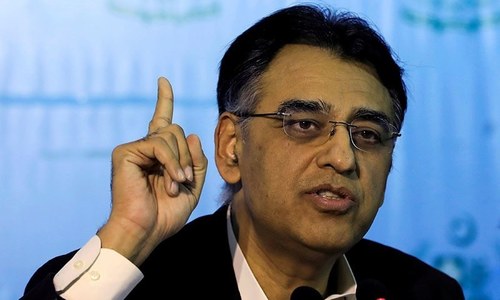Bailout package with IMF almost worked out: Asad

WASHINGTON: Pakistan and the International Monetary Fund (IMF) have — more or less — reached an understanding on a package for bailing out the country’s ailing economy, says Finance Minister Asad Umar.
“During the last two days, we have, more or less, reached an understanding. In the next day or two, we hope to reach a full agreement and then we will share the details with you,” the finance minister said at a Thursday night news briefing at the Pakistan Embassy in Washington.
“In the next step, the IMF will send its mission to Pakistan in the next few weeks to work out technical details. But in principle, we have reached an agreement,” he said.
• Finance minister says FATF judging Pakistan with a rigged jury • Fund officials air concerns over CPEC
The finance minister, who reached Washington on Tuesday evening, left for New York on Friday after two days of talks with the IMF and World Bank officials on the sidelines of the group’s spring meetings. The team of experts that came with him, however, remains in Washington to finalise the details of a multi-billion dollar, three-year bailout package.
Although Mr Umar did not explain the irritants that still need to be worked out, Dawn has learned the IMF is insisting on a market-oriented exchange rate while Pakistan wants to retain its current approach of a managed float.
During the talks, IMF officials shared their concerns on the China-Pakistan Economic Corridor and its possible impact on the IMF programme “but Pakistan assured them that there’s no overlapping between the two programmes,” an official source said.
“Some fine-tuning will be done in Islamabad and then the package will be signed,” the minister said.
Before the news briefing, the finance minister addressed the Pakistani-American community at the embassy, explaining why the country needs a bailout package.
“The more things change, the more they remain the same. This is what Pakistan is experiencing,” he said. “We’ve been going through a recurring cycle of a balance of payments crisis.”
Mr Umar said he could not recall the last time a government in Pakistan had not inherited a balance of payments crisis and sought IMF help. “The pattern has remained the same, in 1988, 1999, 2008, 2013 and 2018,” he said, acknowledging that “there is something, obviously, structurally wrong” with the economic policies followed by successive governments.
“While there may be specific decisions that contribute to this, or people who may be responsible, but there is clearly something structural at play which goes beyond personalities and decisions,” he said.
For some in the audience, it was a pleasant departure from the PTI’s usual practice of blaming everything on the PML-N government.
In a lighter vein, the finance minister told the Pakistani-American community that their country was close to setting a world record, as it was about to enter its 13th IMF programme in 30 years. ‘That’s quite an achievement.”
Mr Umar refuted rumours that he was resigning or being fired. “I am not going anywhere,” he said.
The finance minister said Pakistan was facing three main problems on the economic front — the fiscal deficit, current account deficit and savings and investment gap.
“The situation right now is that we are not taking loans to pay off past loans, but to pay off interest.”
Responding to a question about what actions the Financial Action Task Force (FATF) might take in Pakistan’s case, the minister said the next review would take place in the middle of May and the deadline for Pakistan to send a report for the review is April 15. He said Pakistan would send the report on time and then the review team would visit Pakistan in May but the actual deadline for the final decision is September.
He said Pakistan had made significant improvements since the last review, recognised by “virtually everybody we talked to. The question mark we have is: are we going to be judged by a rigged jury?”
He said he recently wrote a letter to the FATF president asking him to appoint any other member country besides India as co-chair of the Asia-Pacific Joint Group. “The finance minister of India is on record saying that they will use every means at their disposal to economically isolate Pakistan. What better way to isolate Pakistan economically than to get Pakistan on a FATF blacklist?”
The minister said with India co-chairing the proceedings, Pakistan did not expect a fair and unbiased decision from the FATF.
Published in Dawn, April 13th, 2019













































